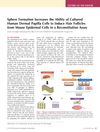 June 2023 in “Antioxidants”
June 2023 in “Antioxidants” Lipids from Schizochytrium sp. help prevent hair loss by protecting hair cells from damage and promoting hair growth.
 April 2023 in “Dermatology practical & conceptual”
April 2023 in “Dermatology practical & conceptual” Lenalidomide helps hair follicle stem cells turn into melanocytes, which may improve repigmentation in vitiligo.
February 2023 in “Research Square (Research Square)” Dihydrotestosterone increases arterial stiffness in female mice without changing blood pressure or aortic wall thickness.

The document concludes that the development of certain tumors is influenced by genetic background and that a specific gene modification can lead to tumor regression and reduced growth.
 January 2022 in “Social Science Research Network”
January 2022 in “Social Science Research Network” Pyruvate Kinase M2 helps hair grow by linking energy production and a key hair growth pathway.
 January 2021 in “Figshare”
January 2021 in “Figshare” Metformin helps regenerate hair follicles in lab conditions.

Grateloupia elliptica seaweed extract may promote hair growth by activating Wnt/β-catenin signaling and cell proliferation.
 January 2016 in “Korean Journal of Pharmacognosy”
January 2016 in “Korean Journal of Pharmacognosy” Grateloupia elliptica, a type of marine algae, may promote hair growth by activating a specific cell growth pathway.
Chinese herb medicines can improve hair growth in mice.
 101 citations,
January 1997 in “Journal of Investigative Dermatology Symposium Proceedings”
101 citations,
January 1997 in “Journal of Investigative Dermatology Symposium Proceedings” Nerves and chemicals in the body can affect hair growth and loss.
 30 citations,
April 2020 in “Stem Cell Research & Therapy”
30 citations,
April 2020 in “Stem Cell Research & Therapy” PI3K/Akt pathway is crucial for hair growth and regeneration.
 22 citations,
February 2008 in “Journal of Dermatological Science”
22 citations,
February 2008 in “Journal of Dermatological Science” EPR spectroscopy showed that spontaneous hair growth results in thicker skin and less pigmented hair than depilation-induced growth.
 19 citations,
June 2021 in “Tissue Engineering and Regenerative Medicine”
19 citations,
June 2021 in “Tissue Engineering and Regenerative Medicine” Fat stem cell particles help regrow hair.
 15 citations,
May 2017 in “Lasers in Medical Science”
15 citations,
May 2017 in “Lasers in Medical Science” Low-level laser treatment helps mice grow hair by increasing certain protein levels linked to hair growth.
 6 citations,
April 2017 in “Journal of Dermatological Science”
6 citations,
April 2017 in “Journal of Dermatological Science” Ovariectomized mice mimic postmenopausal hair loss, and estradiol helps maintain hair density.
 6 citations,
January 2007 in “Actas dermo-sifiliográficas/Actas dermo-sifiliográficas”
6 citations,
January 2007 in “Actas dermo-sifiliográficas/Actas dermo-sifiliográficas” Gray hair regained color after thyroid hormone treatment.
 1 citations,
July 2015 in “Cytokine”
1 citations,
July 2015 in “Cytokine” Finasteride improves immune response and reduces organ damage after trauma hemorrhage in mice.
 237 citations,
June 2013 in “Nature Medicine”
237 citations,
June 2013 in “Nature Medicine” A protein from certain immune cells is key for new hair growth after skin injury in mice.
 115 citations,
November 2004 in “Brain Behavior and Immunity”
115 citations,
November 2004 in “Brain Behavior and Immunity” Stress increases nerve fibers and immune cell activity in mouse skin, possibly worsening skin conditions.
 113 citations,
September 2005 in “Journal of Investigative Dermatology”
113 citations,
September 2005 in “Journal of Investigative Dermatology” Applying a special compound can promote hair growth without harmful side effects.
 88 citations,
February 2011 in “Journal of Dermatological Science”
88 citations,
February 2011 in “Journal of Dermatological Science” Minoxidil helps hair growth by activating the β-catenin pathway.
 75 citations,
August 2011 in “Journal of Investigative Dermatology”
75 citations,
August 2011 in “Journal of Investigative Dermatology” Forming spheres boosts the ability of certain human cells to create hair follicles when mixed with mouse skin cells.
 73 citations,
September 2003 in “Journal of Pharmacology and Experimental Therapeutics”
73 citations,
September 2003 in “Journal of Pharmacology and Experimental Therapeutics” Hair color loss can indicate the effectiveness of a drug targeting the KIT protein in mice and humans.
 69 citations,
December 2011 in “Journal of Ethnopharmacology”
69 citations,
December 2011 in “Journal of Ethnopharmacology” Some Thai plants, especially Carthamus tinctorius, could help prevent hair loss and promote hair growth without adverse effects.
 66 citations,
July 2007 in “Journal of Molecular Medicine”
66 citations,
July 2007 in “Journal of Molecular Medicine” Stress increases certain chemicals in the skin and nerves, which might worsen skin conditions.
 49 citations,
November 2014 in “Journal of Medicinal Food”
49 citations,
November 2014 in “Journal of Medicinal Food” Red Ginseng Extract may help human hair grow by activating growth pathways and blocking negative effects of certain hormones.
 32 citations,
May 2010 in “Pharmacopsychiatry”
32 citations,
May 2010 in “Pharmacopsychiatry” Finasteride reduces new brain cells in male mice, possibly causing depression.
 29 citations,
November 2014 in “Experimental Dermatology”
29 citations,
November 2014 in “Experimental Dermatology” Injecting alpha-melanocyte-stimulating hormone in mice improved skin healing and reduced scarring.
 29 citations,
July 2004 in “Pharmacology, Biochemistry and Behavior”
29 citations,
July 2004 in “Pharmacology, Biochemistry and Behavior” Finasteride reduces alcohol withdrawal effects, especially in female mice.
 26 citations,
May 2015 in “Lasers in Surgery and Medicine”
26 citations,
May 2015 in “Lasers in Surgery and Medicine” Laser treatment helped regrow hair in mice by activating a key growth pathway.



























